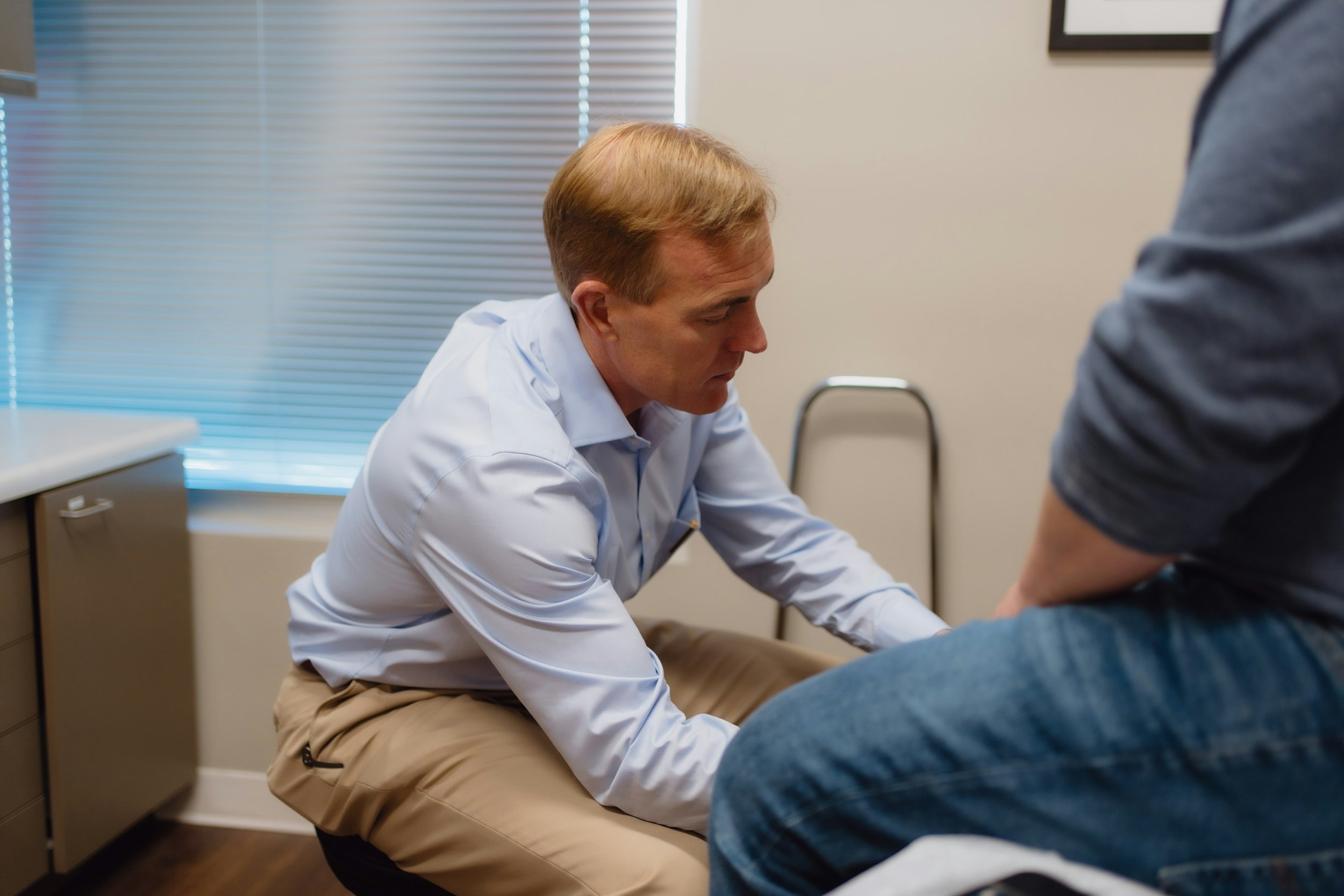
Avascular Necrosis (AVN) of the Hip Treatment in San antonio
What is AVN of the hip?
Also known as osteonecrosis, avascular necrosis (AVN) of the hip can be a source of significant hip pain. This condition disrupts blood flow to the hip joint, leading to bone death and potentially leading to joint collapse. While AVN is serious, early diagnosis and treatment from San Antonio Orthopaedic Specialists' experienced team can help preserve your hip joint and prevent further complications.
AVN of the hip is a debilitating condition that affects the blood supply to the femoral head, the ball-shaped top of your thigh bone that fits into the hip socket. When blood flow is disrupted, bone tissue in the femoral head dies. Without a steady supply of blood, the bone weakens and eventually collapses, leading to pain and limited movement in the hip joint.
Symptoms of Avascular necrosis of the hip
Avascular necrosis (AVN) of the hip can be a sneaky condition that’s commonly linked to a disrupted blood supply to the bone. In its early stages, you might experience no symptoms at all. However, as the bone tissue in the femoral head weakens and the joint begins to deteriorate, some telltale signs can emerge. Here’s what to watch out for:
Hip Pain: This is the most common symptom of avascular necrosis hip. The pain usually starts as a dull ache deep in the groin, buttock, or thigh. It often gets worse with activities that put weight on the hip, like walking, standing for long periods, or climbing stairs.
Pain That Worsens with Activity: As avascular necrosis progresses, the pain can become more intense during activity and may even be felt while resting.
Limited Hip Movement: Stiffness in the hip joint can make it hard to bend, extend, or rotate your hip. This can limit daily activities like putting on shoes or getting in and out of a car.
Pain Radiating Down the Leg: Sometimes, hip pain from avascular necrosis can spread down the leg toward the knee
Don't ignore these symptoms! While they can be caused by other hip problems, if you're experiencing any of them, particularly persistent hip pain that worsens with activity, it's crucial to consult a doctor for a proper diagnosis. Early detection of AVN allows for prompt treatment and helps prevent further damage to the hip joint.
Causes of avascular necrosis
non-traumatic causes:
Corticosteroid Use: Long-term use of high-dose corticosteroids, medications often prescribed for conditions like asthma or lupus, can increase the risk of AVN. The exact mechanism is not fully understood, but corticosteroids may contribute to fat deposits in blood vessels or suppress blood cell production, impairing blood flow.
Excessive Alcohol Use: Chronic heavy alcohol consumption can damage bone tissue and disrupt blood flow, increasing the risk of AVN.
Medical Conditions: Certain medical conditions can raise your risk of AVN, such as:
Sickle cell disease: This blood disorder can cause abnormal blood clotting, potentially leading to blocked blood vessels in the hip.
Gaucher disease: A rare genetic disorder that affects fat storage in the body, including the bones. The buildup of fatty substances can disrupt blood flow.
Systemic lupus erythematosus (SLE): This autoimmune disease can damage blood vessels, including those supplying the hip joint.
Other Risk Factors: Additional factors that may be linked to AVN include decompression sickness (from rapid ascent during diving), radiation therapy, and certain medications besides corticosteroids.
Traumatic Causes:
Hip Fractures or Dislocations: Injuries that damage the blood vessels around the hip joint can disrupt blood flow to the femoral head.
Surgery: In rare cases, surgery around the hip joint can inadvertently damage blood vessels, leading to AVN.
It's important to note that not everyone exposed to these risk factors will develop AVN. Some individuals may be more predisposed to the condition for reasons yet to be fully understood.
If you have any concerns about your medical history or risk factors for AVN, it's important to schedule a consultation with a specialist as soon as possible. They can help you understand your individual risk and recommend preventive measures if necessary.
treatment options for Avascular Necrosis of the hip
he most effective treatment for AVN of the hip depends on several factors, including the severity of the condition, the stage of bone damage revealed by imaging tests such as MRI scans (magnetic resonance imaging), and your overall health. Here’s an overview of the treatment options available
Surgical SOlutions & Treatments:
When avascular necrosis hip is more advanced and the bone has started to collapse, surgery may be needed to preserve the hip joint and restore function. Common surgical options include:
Hip Replacement: If the femoral head has collapsed significantly, a total hip replacement is often the best choice. In this procedure, the damaged hip joint is removed and replaced with artificial parts. Modern hip replacements are durable and can help you move without pain for many years.
Core Decompression: This tissue-sparing procedure involves drilling a small channel into the femoral head. This helps new blood vessels grow into the bone, which can stimulate healing and delay the need for a hip replacement.
Bone Grafting: Sometimes, core decompression is combined with bone grafting. In this procedure, healthy bone tissue from another part of your body is placed into the damaged area of the femoral head. This helps promote new bone growth and supports the joint.
Non-Surgical Treatments:
Rest and Activity Modification: In the early stages of AVN, reducing weight-bearing activities on the affected hip can help limit further damage. This may involve using crutches or a cane for support and avoiding activities that aggravate your pain.
Physical Therapy: Strengthening exercises for the muscles around the hip joint can improve your stability and range of motion while reducing pain and stiffness.
Pain Medication: Over-the-counter pain relievers like ibuprofen or acetaminophen can help manage pain and inflammation. In some cases, your doctor may prescribe stronger pain medication. Learn about the non-opioid pain relief medication, iovera!
hip replacement patient Testimonial
Hear Sherrill share her experience with her left hip replacement surgery by Dr. Harris. She describes living pain-free and regaining her active lifestyle thanks to Dr. Harris's expertise and innovative techniques.
Are you ready to find a solution to treat your hip pain?
Fill out the form below and one of our team members will call you back.
We have over 1,000 online reviews!
Meet Our Hip Specialists





